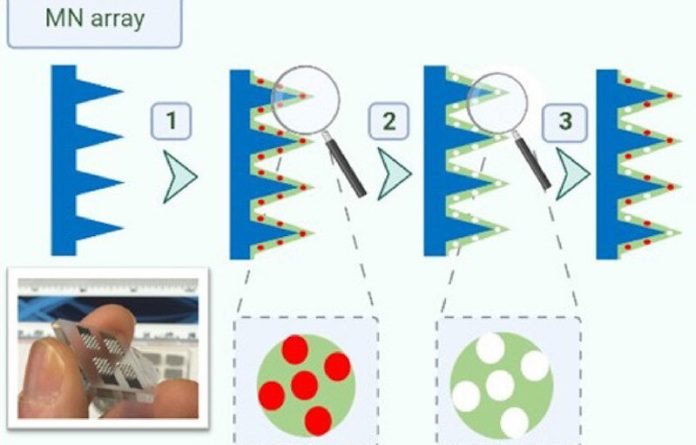
In a study from Swansea University, scientists have developed a new “smart patch” that can detect biomarkers of neurodegenerative diseases (such as Parkinson’s and Alzheimer’s) through the use of microneedle technology.
This breakthrough in the advancement of transdermal capability would mean smart patches could be used to detect certain biomarkers within skin interstitial fluid (ISF) in a “bloodless” manner.
These patches are comprised of arrays of tiny needles (microneedles) designed to break the skin barrier—in a minimally invasive manner—and monitor the biomarkers of clinical significance.
They can be self-administered for point-of-care diagnosis at GP practices or even at home.
This finding has the potential to change the landscape of early neurodegenerative disease detection.
The skin is the largest organ in the body—it contains more ISF than the total volume of blood.
This fluid is an ultrafiltrate of blood and holds biomarkers that complement other biofluids such as sweat, saliva, and urine.
It can be sampled in a minimally invasive manner and used either for point-of-care testing or real-time using microneedle devices.
In the study, the team used microneedle array-based biosensing patches as wearable transdermal sensors to detect the proinflammatory cytokine IL-6.
IL-6 is present in the skin ISF with other cytokines and is implicated in many clinical states including neurodegenerative diseases and fatal pneumonia from SARSCoV 2.
The team was able to detect IL-6 at concentrations as low as 1 pg/mL in synthetic skin ISF, indicating its utility for routine point-of-care, bloodless measurements in simpler settings, worldwide.
This new diagnostic tool, for screening inflammatory biomarkers in point-of-care testing, will see the skin act as a window to the body and vital organs such as the brain.
If you care about brain health, please read studies about how the Mediterranean diet could protect your brain health, and strawberries could help prevent Alzheimer’s disease.
For more information about brain health, please see recent studies about a possible way to delay or reverse Alzheimer’s disease, and results showing this plant compound may help treat Alzheimer’s disease.
The study was conducted by Dr. Sanjiv Sharma et al and published in the journal ACS Omega.
Copyright © 2023 Knowridge Science Report. All rights reserved.



